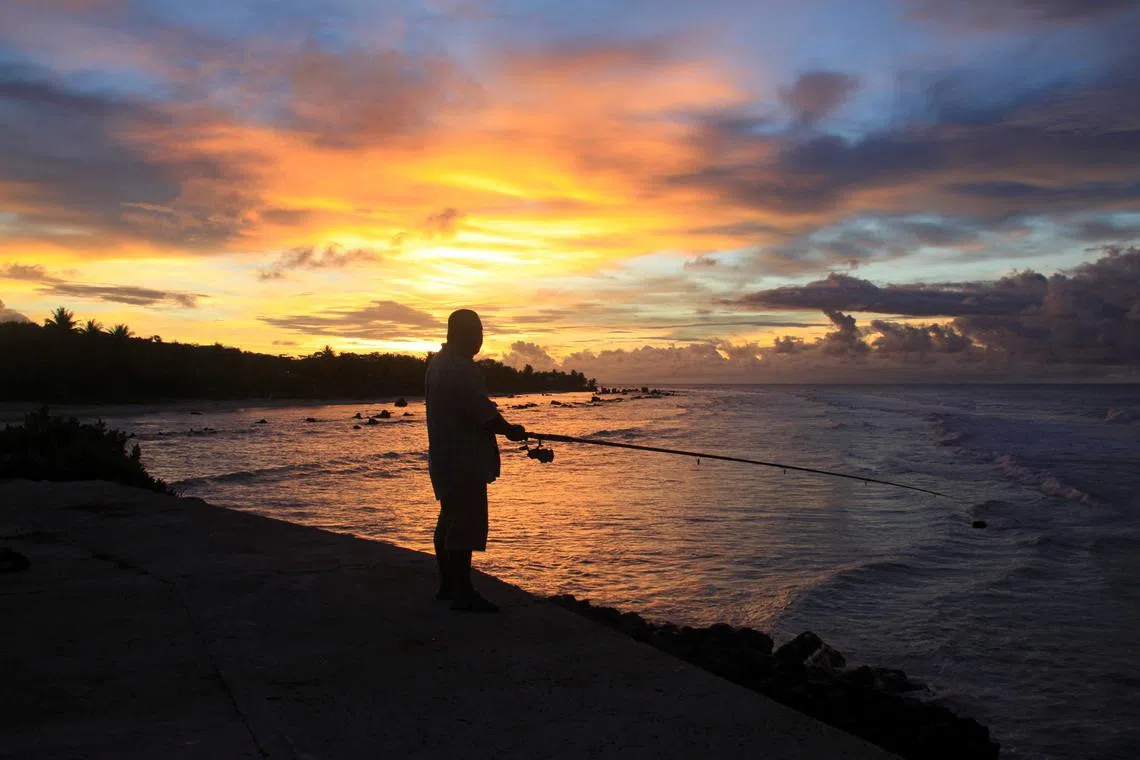Australia allows last refugee on Nauru to leave but retains controversial detention policy
Sign up now: Get ST's newsletters delivered to your inbox

According to the Refugee Council of Australia, 4,183 people have been detained in Nauru and Papua New Guinea since 2012.
PHOTO: REUTERS
Follow topic:
SYDNEY – For the past decade, Australia has been sending asylum seekers to Nauru and detaining them on the tiny Pacific island
In June, it quietly removed the last refugee from Nauru, one of the world’s smallest countries, and flew him to Brisbane. He was reportedly to be held in hotel detention and is seeking resettlement in Canada.
The move marked the end of offshore processing in Nauru despite Australia remaining committed to its costly – and controversial – system of offshore detention.
The federal government first started to send asylum seekers to detention centres on Nauru and Manus Island in Papua New Guinea as part of a policy announced by former prime minister John Howard, leader of the Liberal-National Coalition, in 2001.
After defeating the Coalition at an election, the Labor Party ended offshore detention in 2008, but reopened the centres in 2012 as the number of people arriving by boat – from countries such as Afghanistan, Iran and Iraq – began to rise.
The policy has remained ever since.
The offshore detention system has been condemned as unlawful and inhumane by human rights groups and the United Nations.
In Australia, the policy has led to divisive public debate and put political pressure on the Labor Party, which tends to support a more lenient approach than the Liberal-National Coalition.
Defenders of the policy say a hardline approach is necessary to prevent the flow of asylum seekers.
Britain’s ruling Conservative Party is pursuing a scheme based on Australia’s and wants to send asylum seekers to Rwanda, though a British court ruled on June 29 that the policy was unlawful.
According to the Refugee Council of Australia, 4,183 people have been held in Nauru and Papua New Guinea since 2012, while 47 children were born in detention in Nauru and two in Papua New Guinea.
But the removal of the last detainee from Nauru to Brisbane does not mean that Australia’s controversial policy is entirely over. Prime Minister Anthony Albanese, whose Labor Party was elected in 2022, remains committed to a tough approach to handling asylum seekers.
Indeed, the federal government plans to spend A$485 million (S$437 million) in 2023 on maintaining the empty detention centre in Nauru as a deterrent to future asylum seekers. Also, in future years, it expects to spend A$350 million a year, even though the detention centre is likely to remain empty. This is a hefty sum to spend in a remote country with a population of about 9,800 and an annual gross domestic product of about A$150 million.
Commenting on the costs of keeping the centre open, Department of Home Affairs Secretary Michael Pezzullo told a parliamentary committee in May: “It’s the policy as well as the direction given to the department to reduce the population to zero and then to transition the facility into a contingency facility, or an enduring one.”
Since 2013, arrivals taken to offshore detention centres have been barred from resettling in Australia.
About 80 asylum seekers remain in Papua New Guinea after being freed from detention. Most are reportedly seeking to resettle elsewhere. Refugee advocates say many of them suffer mental health issues due to their poor treatment.
Human Rights Watch, a non-governmental organisation, said the offshore detention centres had led to people suffering “severe abuse, inhumane treatment and medical neglect”. It called on the government to end “its unlawful and expensive policy”.
“While the final evacuation from Nauru is a significant step towards dismantling Australia’s ill-conceived offshore processing system, the government still has a long way to go,” Ms Nicole Tooby, from the organisation’s Asia division, said in a statement.
Mr Albanese and his Labor MPs have largely avoided commenting on the Nauru closure and typically prefer to avoid discussing the party’s detention policy.
Presumably, they are aware of the political risks of being painted as soft on border security, but are mindful of angering the party’s left-leaning supporters, who want the offshore detention system to be completely dismantled.
Ms Betelhem Tibebu, an asylum seeker from Ethiopia who was held for two years on Nauru and now lives in Australia, said it was “hell” and she was pleased to hear that the last detainee had been removed.
“They should not have left the person alone there on the island (by) himself,” she said in a statement provided by the Asylum Seeker Resource Centre.
“He is a hero… That place should be closed, it is where so many young people lost their future.”
She added: “For 10 years, that place for us was fear.”


